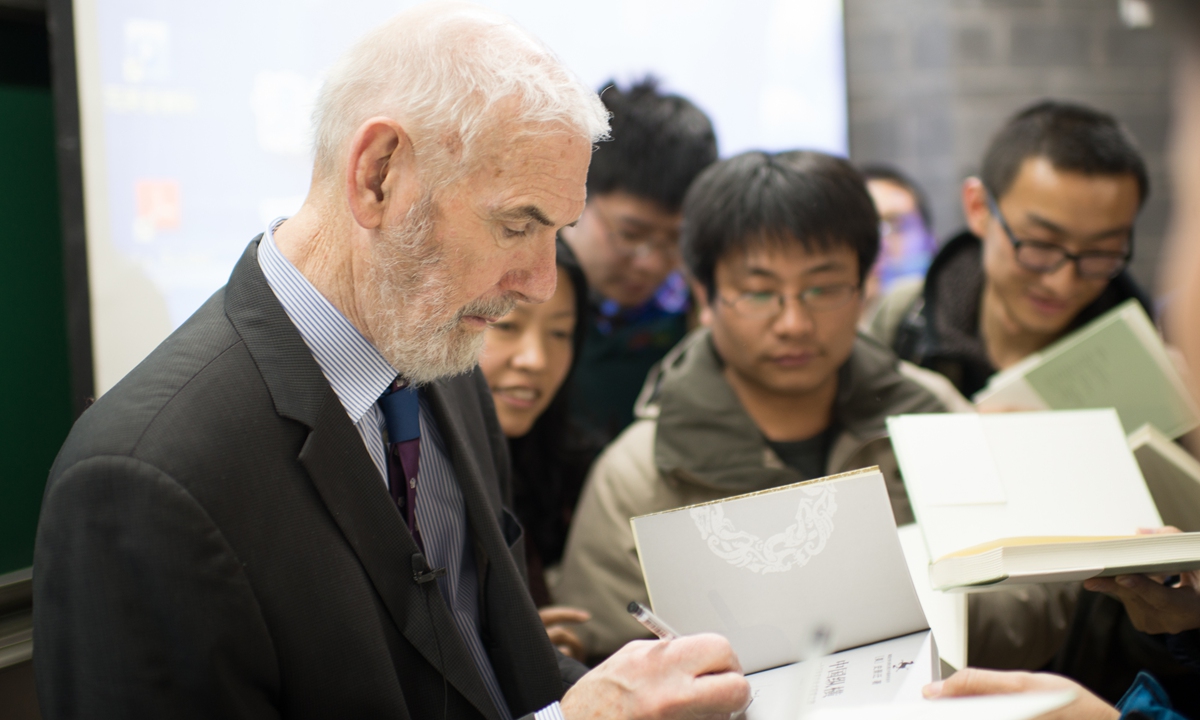
Sinologist Jonathan D. Spence signs a book for students after a lecture in Peking University in Beijing on February 28, 2014. Photo: VCG
Jonathan D. Spence, a British-born historian who became a longtime Yale University professor and prominent sinologist and attracted a wide following with his 1990 bestseller
The Search for Modern China, has died at age 85.
Spence, who retired from Yale in 2008, died Saturday at his home in West Haven, Connecticut. His wife and fellow Yale professor, Annping Chin, said the cause was complications from Parkinson's disease.
The recipient of a MacArthur fellowship, a Los Angeles Times book prize and numerous other honors, Spence wrote more than a dozen books on China, along with reviews, essays and lectures. He was best known for
The Search for Modern China, an 870-page publication that began in the 17th century, at the peak of the Ming Dynasty (1368-1644).
As suggested by the book's title, Spence approached China as if writing a detective story, deciphering for Western readers one of the world's largest, most populous and complex countries.
Drawing upon scores of previous books and original papers, he documented China's history of extreme upheavals and lasting traditions.
He noted the "patterns of generational deference and concepts of obligation" and the rebellions designed to shatter them, whether the sacking of Beijing in 1644 or the 1911 fall of the last emperor.
"We can see how often the Chinese people, operating in difficult or even desperate circumstances, seized their own fate and threw themselves against the power of the state," he wrote.
Telling the tale of ChinaSpence's book was praised by critics, reached The New York Times' bestseller list, remains widely used in classrooms and is often credited with popularizing Chinese studies.
"He narrates history that is always lively, always concrete, always comprehensible, no matter how complex the issue," wrote the Times' Christopher Lehmann-Haupt, who added that the book "will undoubtedly become a standard text on the subject."
Spence's other works included
The Memory Palace of Matteo Ricci, about one of the first Jesuit missionaries to China. A 1996 book,
The Chinese Century: A Photographic History, was co-authored by Spence and Annping Chin.
Survivors include two sons from his first marriage, to Helen Alexander, and two stepchildren. Born in Surrey, England, Spence grew up in a family of book lovers: His father was an editor, his mother a reader of French literature.
He was an undergraduate at Clare College, Cambridge, where he edited the student newspaper and co-edited the student magazine Granta, now one of the world's most prestigious literary journals.
After graduation, he received a fellowship at Yale and befriended the China scholar Mary Wright, who became a mentor. Through Wright, he met the biographer Fang Chao-ying and was granted special access to papers in the Taiwan island from the Qing Dynasty (1644-1911), material used in his dissertation and his first book,
Ts'ao Yin and the K'ang-hsi Emperor: Bondservant and Master, which came out in 1966, the same year he joined the Yale faculty.
"I was able to hold in my hand the original writings of the emperor of China," he said in a 2010 interview with Humanities magazine, the in-house publication of the National Endowment of the Humanities.
"It was something that is still very emotional for me, and it was a major moment for my thinking about the past."
"If you want to really know something, you have to observe or experience it in person. If you claim to know something on the basis of hearsay, or happen to see it in a book, you'll be a laughingstock to those who really know," Spence wrote in his book
Emperor of China: Self-Portrait of K'ang-hsi (1988).
He first traveled to the Chinese mainland in 1974, two years after US president Nixon's first visit to the country.
The historian was charmed by the developments taking place at the time and this became one of his major inspirations behind the iconic book
The Search for Modern China (1990).
Spence's Chinese name Shi Jingqian originated from the author's storytelling character. The name means "aspire to Jingqian," with Jingqian referring to Sima Qian, a Western Han Dynasty (206BC-AD8) scholar who is often considered China's greatest historian.
Called the next key sinologist after John King Fairbank, the guru of modern Chinese Studies in the US, Spence's research was unique for his true-experience-based "storytelling" writing style that engaged not only academia but also history fans.
Mourning in ChinaNews about Spence's passing quickly began trending on China's Twitter-like Sina Weibo, leading to an outpouring of grief and messages of mourning as Chinese netizens shared their connections to the esteemed scholar.
The related hashtag for the news earned more than 34 million views in just a few hours.
"We had a reading corner at school to read his writings. I never got bored with his work. I sometimes feel other historical texts are too serious. RIP," posted a netizen on Weibo.
Chinese historian Wang Yuanchong once told media that Spence's works had successfully stimulated an interest in Chinese history among a large number of non-academic readers around the world.
"His lecture was so engaging. I like how he sees the whole historical picture of China from small characters. We are the mirror of the society," posted a netizen on Sina Weibo.




